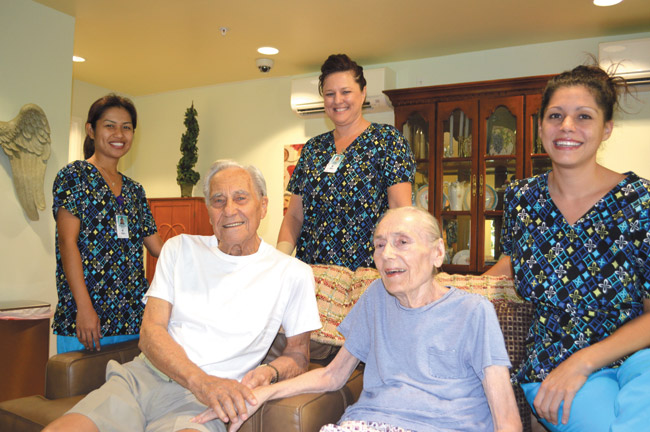New Chapter In A Long Love Story

Ken and Jane Turner with Wilson Senior Living staffers (from left) Primerose Pasay, Mary Bowman and Heather O’Connor | Photo from Sandy Hoen
In sickness or in health, the love of a Kailua couple prevails as home health care living options remain in high demand within Hawaii’s burgeoning elderly population. Ken and Jane Turner have given up their privacy of the finer things in life, including a home near Portlock in Hawaii Kai and most recently, their retirement condo in Kailua. For 25 years, Jane tended to her paralyzed son until his death in 2004. “She cared for our two sons and me, and now it’s my turn to take care of her,” says Ken.
Today, Parkinson’s disease has taken a toll on Jane’s vocal chords and failing health, and Ken’s weak heart forced the handsome couple to live together as husband and wife in a care home facility.
“There’s a lot of stuff that we left behind. That’s what hurts, but everything is fine here. We are fed three times a day and get anything we want at our beck and call,” says Jane.
It can be tough to acclimatize to a new environment during the final stage of life, but the Turners, who are both in their mid 80s, found a home away from home at the new Wilson Senior Living in Kailua. It’s a 22-bed facility on a 16,000-square foot lot that “offers a loving and nurturing experience, plus, the 24/7 care Jane needs,” according to Shelly Wilson, founder and president.
“The people here are compassionate and understanding. They look after Jane so much better than I could have with the five independent care givers I hired in our condo,” says Ken. He sleeps better at night now, knowing that in his absence Jane will be cared for.
“I don’t even want to think about him going first. I just enjoy the present, being together with Ken here and enjoying each other’s company, hand in hand,” explains Jane.
Ken, who worked 30 years in the heavy equipment industry primarily in sales, still showers Jane with roses and takes her out on sweet dates. Their hearts still go “pitter-patter” as these elderly lovebirds occasionally venture to their old stomping ground in Hawaii Kai, eating at Assaggio’s restaurant. The highlight of their week is watching Dancing with the Stars. Ken will occasionally enjoy his favorite gritty World War II action movie, Twelve O’Clock High starring Gregory Peck on DVD at the care home.
“Ken and Jane are the very reasons I developed our senior living facility,” says Wilson. “It provides the foundation and services that help families fulfill the clinical needs and emotional well-being of their loved ones, giving them peace of mind in knowing that their kupuna and relatives are well-cared for, utilizing the hospitality industry’s concept of service, right down to the mint on the pillow when they retire to bed at night.”
Wilson’s facility is one of a host of state-licensed retirement communities in Hawaii that are starting to pop up to cater to an overwhelming need for residential senior home care. The latest statistics and census show that, since 2000, Hawaii has the fastest-growing aging population in the nation. Between 1990 and 2012, the number of the elderly ages 75 and older rose by 47 percent nationally compared to a 116 percent increase in Hawaii. The 65 and over population is expected to grow in Hawaii by 81 per cent by 2030. While residents in the 50th State have the greatest longevity in the U.S., we only have half as many nursing home beds available per capita as the national average. Hawaii’s occupancy rate in 2010 was the highest in the country.
“As baby boomers age and Hawaii’s senior population rises, it is tough to meet and keep up with the increasing demand, and our elderly community will ultimately be underserved,” said Tricia Medeiros, regional director of The Plaza Assisted Living in Hawaii which has three locations on Oahu at Punchbowl, Mililani and Moanalua, with a fourth slated to open inPearl City next October. The Plaza is an apartment-style rental community for seniors that provides services, including meals, housekeeping, activities, linen services and scheduled transportation. It is not a care home, but like Wilson Senior Living has a nursing team on staff to provide bathing, dressing, incontinence management and assistance with medication.
The average cost for homecare or assisted living throughout the state per person ranges from $3,500 to $8,000 per month, depending on disability and/or the type of 24-hour care needed. Unfortunately, there are those elderly who are disabled or who are without the resources to afford the luxuries of a nursing home or assisted care. Ken and Jane Turner feel blessed that Ken was given financial opportunities in his career to save a nest egg that has gotten them to where they are today. The Turners look forward to enjoying their ripe old age through the last chapter of a storybook life, aging gracefully together in their golden years.
mufi@mufihannemann.com





